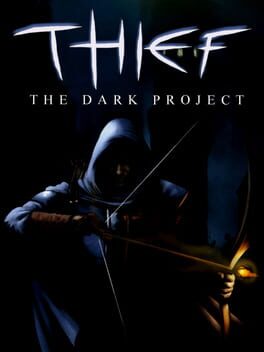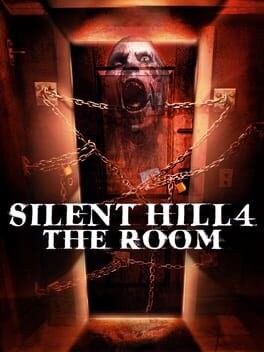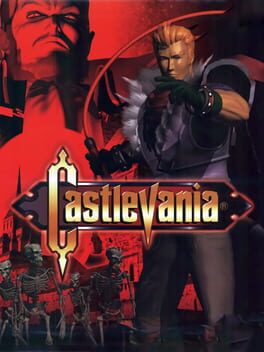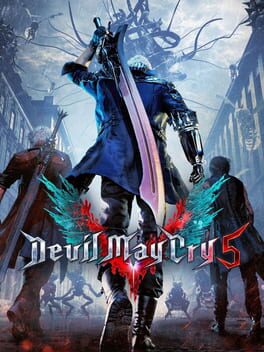stellaris
Bio
Heh...it's a throne room.
Heh...it's a throne room.
Badges

N00b
Played 100+ games

Loved
Gained 100+ total review likes

GOTY '23
Participated in the 2023 Game of the Year Event

Well Written
Gained 10+ likes on a single review

Best Friends
Become mutual friends with at least 3 others

Liked
Gained 10+ total review likes

Gone Gold
Received 5+ likes on a review while featured on the front page

Noticed
Gained 3+ followers
Favorite Games
111
Total Games Played
000
Played in 2024
000
Games Backloggd
Recently Reviewed See More
Been thinking about this one lately. Silent Hill 4: The Room is a weird messy game, in line with honestly most of the series being weird and messy as well. This is a game that is about the corrosive effects of agoraphobia and how that leads to repetitious days, which of course gets reflected in the game itself in ways that can be honestly really frustrating to players including myself.
A fairly common critique of this game is that the second half is bad, and this is due to the fact that you are having to protect Eileen while going through environments that you were in before. It has often been speculated that the game was rushed development-wise which is what led to the recycling of assets, and that a lot of the game's flaws are therefore stemming from that. I can certainly understand this perspective, since Silent Hill 4: The Room has as many locations any other Silent Hill game before this point, and in terms of budget and development time it probably wasn't feasible to invent even more new areas for the back half of the game.
But like it's also complicated? This repetition is supposed to be frustrating because of how it is manifesting a lot of the game's subtextual notions. Henry is fairly explicitly an isolated agoraphobe, this is something that is true even outside of the context of the game's plot mechanics itself by examining how he actually lives in his apartment, how little care to decor he's devoted to and how little interest he has in the things around him. You can examine his stove for instance and he'll make a comment on how he isn't hungry or doesn't want to cook or anything, along with how often the game uses non-optional voyeuristic camera perspectives with him. This is why Henry speaks in such a strange detached way, I read it that he's not only very introverted but he's also very depressed.
Eileen is the only person in the game you are capable of having meaningful interactions with, which in a lot of metaphorical ways shows the frustrations of actually combatting agoraphobia. It can feel like a complete uphill battle to forge a meaningful connection with someone of you've convinced yourself the outside world is actively hostile and malevolent.
One thing that stuck in my mind is the WHY of why The Room is the center of how the Otherworld is projecting outwards, and at its core it all stems from loneliness and isolation. Walter Sullivan was indoctrinated into a cult that actively dehumanizes its individual members to hate the world, and yet in pretty fucked up ways he still wants to connect with people and attempt to see people. This is why he wants Eileen to be reborn as a Holy Mother, and also extremely notably why he wants Henry as this container of knowledge. I don't think it's coincidental that Henry of all people is involved with all this, I feel like a lot of this happened BECAUSE of how Walter related to those feelings of isolation and twisted that into these really dark manifestations. Why else would he continually have Henry see aspects of his own memories while he commits murders? He wants someone to see what he went through, but is incapable of progressing beyond showing his wounds.
All this to say, I ended up really vibing with this game. There are very many obvious issues to observe with it, but I want to accept and understand things the way they are now instead of imagining an alternate 'fixed' version that will never exist, and I relate highly to this game because it reflects a lot of my own issues in ways I rarely see other media tackle, which is enough for me.
A fairly common critique of this game is that the second half is bad, and this is due to the fact that you are having to protect Eileen while going through environments that you were in before. It has often been speculated that the game was rushed development-wise which is what led to the recycling of assets, and that a lot of the game's flaws are therefore stemming from that. I can certainly understand this perspective, since Silent Hill 4: The Room has as many locations any other Silent Hill game before this point, and in terms of budget and development time it probably wasn't feasible to invent even more new areas for the back half of the game.
But like it's also complicated? This repetition is supposed to be frustrating because of how it is manifesting a lot of the game's subtextual notions. Henry is fairly explicitly an isolated agoraphobe, this is something that is true even outside of the context of the game's plot mechanics itself by examining how he actually lives in his apartment, how little care to decor he's devoted to and how little interest he has in the things around him. You can examine his stove for instance and he'll make a comment on how he isn't hungry or doesn't want to cook or anything, along with how often the game uses non-optional voyeuristic camera perspectives with him. This is why Henry speaks in such a strange detached way, I read it that he's not only very introverted but he's also very depressed.
Eileen is the only person in the game you are capable of having meaningful interactions with, which in a lot of metaphorical ways shows the frustrations of actually combatting agoraphobia. It can feel like a complete uphill battle to forge a meaningful connection with someone of you've convinced yourself the outside world is actively hostile and malevolent.
One thing that stuck in my mind is the WHY of why The Room is the center of how the Otherworld is projecting outwards, and at its core it all stems from loneliness and isolation. Walter Sullivan was indoctrinated into a cult that actively dehumanizes its individual members to hate the world, and yet in pretty fucked up ways he still wants to connect with people and attempt to see people. This is why he wants Eileen to be reborn as a Holy Mother, and also extremely notably why he wants Henry as this container of knowledge. I don't think it's coincidental that Henry of all people is involved with all this, I feel like a lot of this happened BECAUSE of how Walter related to those feelings of isolation and twisted that into these really dark manifestations. Why else would he continually have Henry see aspects of his own memories while he commits murders? He wants someone to see what he went through, but is incapable of progressing beyond showing his wounds.
All this to say, I ended up really vibing with this game. There are very many obvious issues to observe with it, but I want to accept and understand things the way they are now instead of imagining an alternate 'fixed' version that will never exist, and I relate highly to this game because it reflects a lot of my own issues in ways I rarely see other media tackle, which is enough for me.
This game's neat. I like it's vibes, Carrie is a fun character to play as, after multiple replays the controls feel pretty natural especially in comparison to LoD's changes.
To some extent the game is unfairly maligned in that a lot of critiques of it are pretty bad faith, but of course the game does have some real problems that become grating on replays. Castle Center's requirements of backtracking to pick up multiple Mandragoras sticks out a lot as needless padding, particularly when the Nitro run to the boss arena is already tense enough. I also think the Day/Night cycles while interesting in its effects on damage and getting a potential bad ending route is fairly poorly implemented, the most egregious example being how the Rosa cutscene can't be watched after using a Day card thanks to a hard cutoff at 6AM.
Like yeah the game's got problems, but I don't feel like dwelling on those or continually coming up with justifications when it's not going to change the game to be better in the future or something. The game is what it is, and accepting these faults rather then letting them sand you down will lead to a probably more enjoyable experience if you attempt replays on Hard and the like.
I like the game's expansion of the vampires (that the rest of the series never followed), since it gives an actual context to what exactly Dracula does to people by making it relate to the personal, be it with Carrie's cousin or the Rosa plotline. It adds that little bit of complexity that would later be expanded in Aria of Sorrow to actually DO something with the series's main villain, and that's pretty cool imo.
A lot of levels from a pure vibes based are excellent, the game is extremely effective at capturing specific moods that, while not 'arcade-y' like past titles, do evoke a specific horror vibe that is fitting of the series. My favorite in probably the whole series is Tower of Sorcery, simply because I think it's beautiful to look at while also being hard as shit like the classics.
Castlevania N64 is a huge 'what if' that never really came to pass, and in some respects that's a shame since I think the core that's here really could be solid if it continued to be iterated upon and not rushed out the door or partially butchered for the same year expansion pak/remake/prequel game. Art deserves better then to be seen as just corporate products, and C64 culturally has been wrapped up too much in its value as a 'meddled product' and not enough on what it is artistically.
To some extent the game is unfairly maligned in that a lot of critiques of it are pretty bad faith, but of course the game does have some real problems that become grating on replays. Castle Center's requirements of backtracking to pick up multiple Mandragoras sticks out a lot as needless padding, particularly when the Nitro run to the boss arena is already tense enough. I also think the Day/Night cycles while interesting in its effects on damage and getting a potential bad ending route is fairly poorly implemented, the most egregious example being how the Rosa cutscene can't be watched after using a Day card thanks to a hard cutoff at 6AM.
Like yeah the game's got problems, but I don't feel like dwelling on those or continually coming up with justifications when it's not going to change the game to be better in the future or something. The game is what it is, and accepting these faults rather then letting them sand you down will lead to a probably more enjoyable experience if you attempt replays on Hard and the like.
I like the game's expansion of the vampires (that the rest of the series never followed), since it gives an actual context to what exactly Dracula does to people by making it relate to the personal, be it with Carrie's cousin or the Rosa plotline. It adds that little bit of complexity that would later be expanded in Aria of Sorrow to actually DO something with the series's main villain, and that's pretty cool imo.
A lot of levels from a pure vibes based are excellent, the game is extremely effective at capturing specific moods that, while not 'arcade-y' like past titles, do evoke a specific horror vibe that is fitting of the series. My favorite in probably the whole series is Tower of Sorcery, simply because I think it's beautiful to look at while also being hard as shit like the classics.
Castlevania N64 is a huge 'what if' that never really came to pass, and in some respects that's a shame since I think the core that's here really could be solid if it continued to be iterated upon and not rushed out the door or partially butchered for the same year expansion pak/remake/prequel game. Art deserves better then to be seen as just corporate products, and C64 culturally has been wrapped up too much in its value as a 'meddled product' and not enough on what it is artistically.







